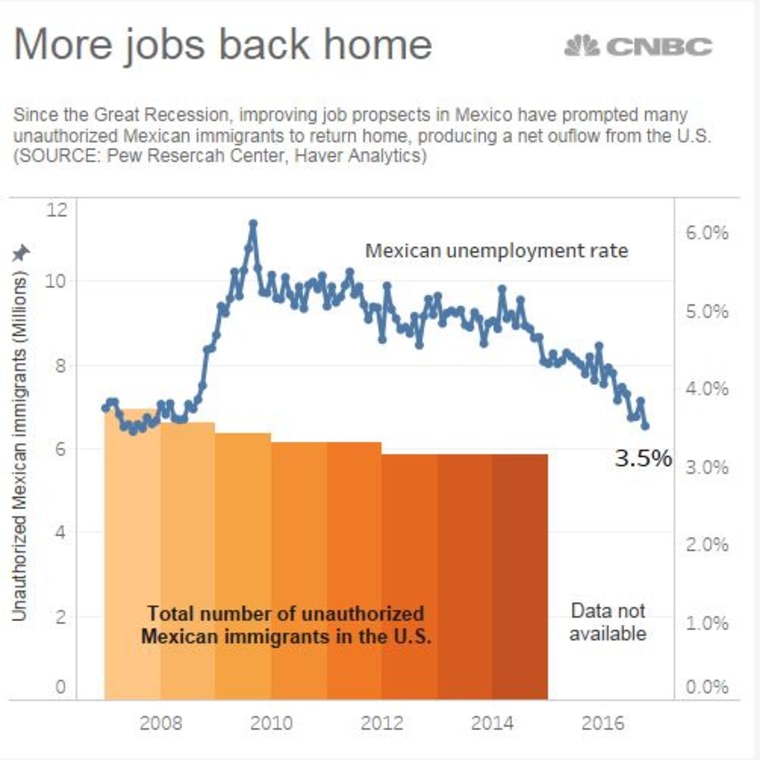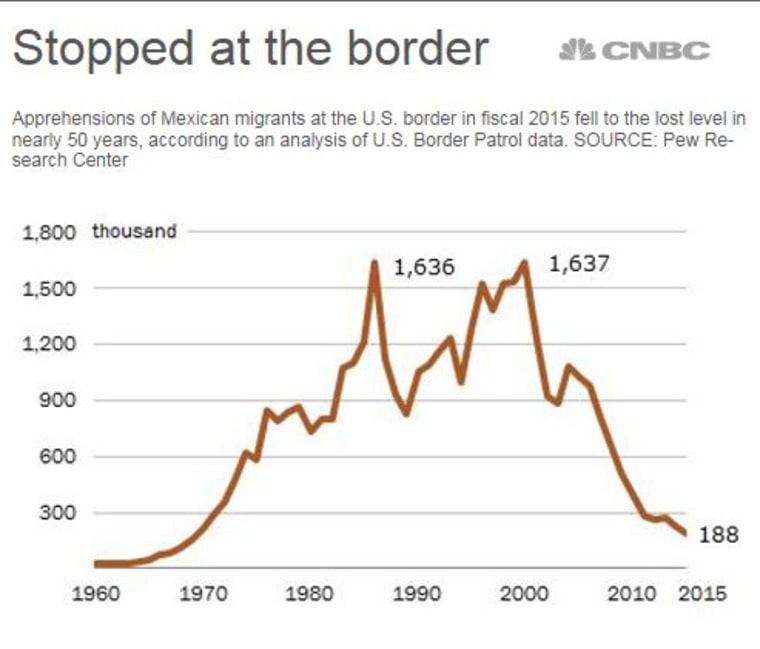President-elect Donald Trump's harsh stance on Mexican jobs and immigration could end up backfiring — by prompting more Mexicans to look for work in the United States.
Since the Great Recession, improved job prospects in Mexico have prompted a greater number of unauthorized Mexican immigrants moving from the United States back to Mexico than the other way around, immigration data show. Many of those new jobs in Mexico have come about thanks to a rising amount of trade between the two countries since 1994, when NAFTA went into effect.
Between 2009 and 2014, a million Mexican families, some of whose children were born in the United States, returned to Mexico, according to an analysis by the Pew Research Center. The analysis also found that, in addition to reversing the flow of Mexican immigration, the overall level of migration between the two countries, in either direction, fell to its lowest level since the 1990s.

The trend also shows up in the data on U.S. border apprehensions of Mexican migrants, which fell in fiscal 2015 to the lowest level in nearly 50 years, according to a separate Pew Research Center analysis of U.S. Border Patrol data.
Trump on Wednesday repeated his promise to make it much harder for U.S. companies to invest in expanded production south of the border.
"The word is now out that when you want to move your plant to Mexico or some other place, and you want to fire all of your workers from Michigan and Ohio and all these places that I won, for good reason, it's not going to happen that way anymore," Trump told reporters at a press conference in New York. "You're going to pay a very large border tax."
Investments in Mexico from companies in the U.S. and around the world have helped created an improved job outlook for many Mexicans without legal status who have moved back home in recent years. But a number of American firms have cut or reduced plans to invest in Mexico in recent weeks. Earlier this month, Ford canceled plans to build a small-car factory south of the border, while announcing 700 new jobs in Michigan.

But President-elect Trump's promise to restrict Mexican exports to the U.S. could produce a wave of layoffs south of the border, sparking a renewed increase in migration north.
Mexico sends some 80 percent of its exports to the United States, in part because of the low barriers implemented by the North American Free Trade Agreement (NAFTA) between the U.S. Mexico and Canada.
Trump has called NAFTA a "disaster" and vowed to scrap or recast it in the hope of bringing jobs back to the United States.
But Mexican workers would not be the only ones at risk of losing their jobs if the Trump administration scarps NAFTA and puts up trader barriers that would invite retaliation.
Mexico was the second largest market for U.S. exporters in 2015, behind Canada, accounting for nearly 16 percent of total U.S. exports that year, according to the U.S. Trade Representative. That amounted to more than a quarter trillion dollars of goods and services, a more than 5-fold increase since NAFTA was enacted.
If Mexico retaliated in a Trump-initiated trade war, the biggest losers in the U.S. would be manufacturers of machinery and vehicles. Farmers would also suffer; Mexico is the third largest buyer of U.S. agricultural products, behind China and Canada.
Mexican president Enrique Pena Nieto said Wednesday he is willing to negotiate with the new administration on a broad range of issues.
Pena Nieto said the U.S. government shares responsibility for migrants seeking to reach the United States, and should also work to stop the southward flow of weapons and illicit funds that help finance Mexican organized crime.

